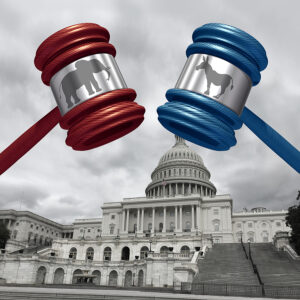Edmund Burke, the 18th-century British statesman, argued during the celebrated impeachment of Warren Hastings, the governor of Bengal, that impeachment was essentially a political process, not a judicial one. Quite so.
The political dimension of impeachment is again on display in Washington, where the Republicans, driven by a faction of the party, are moving toward impeaching President Biden.
Historically, presidential impeachment has been reserved for actions that meet the undefined standard of “high crimes and misdemeanors.” It has been used with incredible restraint; until the impeachment of Bill Clinton, only Andrew Johnon had been impeached. The bar was lowered for the Clinton action then, and the attempt to impeach Biden is a further lowering — pointing up that it is, as Burke argued, a political process.
Impeachment is becoming a common political tactic, not as envisaged by the Founders, the ultimate censure, leading to a trial in the Senate and removal from office.
The two indictments of Donald Trump met, to my mind, the constitutional standard, and had the Senate been in other hands, led to a trial and removal. It is argued that those indictments didn’t meet the standard and were no more than censure by another name, carried out along party lines.
The gravity of impeachment has been preserved since the republic’s beginning, but it is in danger.
Some aspects of the structure of the state should be out of reach of the political process. The Constitution guarantees that it can’t be easily amended, or today it wouldn’t be recognizable, as every fashionable fixation would have been added. The mistake of Prohibition would be written again and again.
When the Northern Ireland peace accords were being written, I was involved with a lively summer school in Ireland — which might be thought of as a think tank that meets once a year.
This organization, the International Humbert Summer School, studied Ireland’s relationship with the world but became involved in the peace process. There were speakers from the Unionists (pro-British) and Sinn Fein, the political wing of the IRA.
At one session, my role was to respond to the late Martin McGuinness, widely known as a top leader of the IRA, believed by the British to be a terrorist with blood on his hands.
Because I have a British accent, the organizers, John Cooney, the Irish historian and journalist, and Tony McGarry, a prominent local headmaster in Ballina, County Mayo, where we gathered, were nervous about what I might say to a man who was regarded with fear and awe as a killer.
Our event turned into a debate. McGuinness was sharp, had a good sense of humor and was open to ideas. Because the IRA had been engaged in armed struggle for so long, it hadn’t thought about constitutional arrangements in peace.
Thinking of the U.S. Constitution, I suggested to McGuinness that if a new constitution for Northern Ireland were to be written, it should sweep nothing under the carpet by ignoring it (as was the American case with slavery) and that when finished, it should be placed on “a high shelf” from which it couldn’t be easily taken down.
McGuinness agreed heartily, leading to a discussion of constitutions and systems of government and how the drafting could be perfected.
But my idea of a high shelf was what stuck with him.
So, it is profoundly disheartening to see impeachment treated as just another political tactic to be launched against any American president simply because the opposition party doesn’t like the president’s policies. But that is what is happening.
Incidentally, the impeachment of Warren Hastings, which dragged on for years and was enormously expensive, ended in acquittal before the House of Lords, proving Burke’s point that impeachment was a political process.
In the United States, we have avoided keeping it out of the political maelstrom for most of our history. It is sad to see it used now as a purely political tactic.
We have a permanent campaign for the presidency. No sooner is one election certified than rumblings about the next one, with all the attendant speculation, begin.
Will presidential impeachment become part of the political process? And what if a Senate has a two-thirds’ majority to convict on political grounds? There is danger here.
At the end of our exchange, I wished the IRA leader “the best of British luck.” He laughed. No attempt to kneecap me followed.


